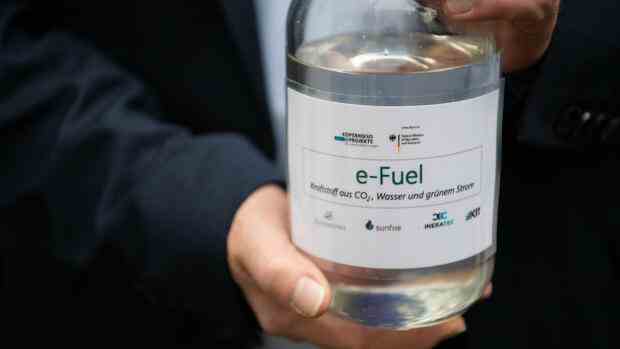E-fuels are inefficient, cars fueled with them require almost five times as much energy per kilometer as a battery car, and they are correspondingly expensive.
(Photo: dpa)
Should economic historians pursue the question of how southwest Germany could have become Europe’s rust belt in many years’ time, the events of the past few weeks should receive special recognition. Imagine the future of the European automotive industry is at stake – and the car nation Germany is forcing a phantom debate on Europe.
E-fuels: yes or no? Combustion off 2035 or off for the combustion engine off? If it were possible to use the energy that recently flowed into this discussion in Brussels to produce climate-neutral fuels, the turnaround in transport would be child’s play.
Only the laws of physics get in the way of innovation. While Europe is arguing about a technology that even the car companies believe will only lead a niche existence, competitors are overtaking European manufacturers and their suppliers in the fight for tomorrow’s mobility.
China Battery dominance should not be a reason to stick with combustion engines
Cheap cars made in China will be entering the European market en masse in the coming years. China already exports more cars than Germany, as current export statistics show. Why? Because China is investing in electromobility with all its might. The Americans accept the challenge: Their climate subsidy program, the Inflation Reduction Act (IRA), is an economic challenge to Beijing.
The most important component of an electric car is the battery. According to the European Battery Alliance, an association of the EU, member states and companies, a battery in China costs 127 dollars per kilowatt hour of output. The US will catch up with the Chinese thanks to lavish IRA funding. And in Europe? There the price increases because of the expensive energy. In 2022, the cost per kilowatt hour was $169 and will soon be $178 – 40 percent higher than in China and the USA.
>> Read here: Lindner plans tax benefits for cars with synthetic fuels – SPD warns of “Lex E-Fuels”
Even the quality image of the German car industry cannot compensate for this price difference. Competitiveness is eroding dramatically, but German Transport Minister Volker Wissing (FDP) prefers to be celebrated for its PR success with e-fuels. No wonder the Federal Republic’s reputation in Brussels is dwindling. The divided traffic light coalition exports its conflicts to Europe.
Every week, Moritz Koch, head of the Handelsblatt office in Brussels, analyzes trends and conflicts, regulatory projects and strategic concepts from the inner workings of the EU, alternating with other Brussels correspondents. Because anyone interested in business needs to know what’s going on in Brussels. You can reach him at: [email protected]
But isn’t the battery dominance of the Chinese perhaps the key reason for sticking with combustion engines? Exactly not. E-fuels are inefficient, cars fueled with them require almost five times as much energy per kilometer as a battery car, and they are correspondingly expensive. The fact that Federal Finance Minister Christian Lindner (FDP) is already talking about tax incentives for e-fuels is reminiscent of the desperation of stagecoach manufacturers after the invention of the automobile.
The crucial debate for Europe cannot be to preserve old technologies, but to develop new ones. The Commission has made proposals for this: Strategically important products such as batteries should be promoted more in Europe in order to balance the competitive advantage of the Chinese and the subsidy offensive of the Americans.
One would expect the government of a country like Germany, where according to state figures 800,000 industrial jobs directly depend on the car, to at least have the right debates.
More: That’s what the argument about e-fuels is about
